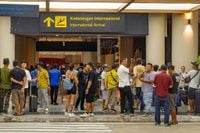In an effort to enhance national security and foster better international relations, the U.S. Air Force is prioritizing cultural and language training for its personnel, particularly in the Indo-Pacific region. This initiative is critical given that this vast area is home to nearly 40 nations, over half of the world’s population, and seven of the globe’s largest militaries. The U.S. Air Force Culture and Language Center (AFCLC), located at Maxwell Air Force Base in Alabama, is spearheading this initiative through its Language Enabled Airman Program (LEAP).
According to AFCLC Director Howard Ward, the integration of language, regional expertise, and cultural (LREC) skills is essential for developing combat-ready forces. “To defeat the strategy of our adversaries, our operational output as a team must be greater than the sum of the parts,” Ward explained. The program aims to cultivate service members with cross-cultural and foreign language proficiency, thereby enhancing operational effectiveness and diplomatic engagement.
U.S. Air Force 2nd Lt. Chance Italiano, who joined LEAP nine years ago as a staff sergeant, exemplifies the program's success. Initially scoring a limited-working proficiency in Japanese, Italiano utilized AFCLC’s online language and culture courses to achieve fluency. His training culminated in a Language Intensive Training Event in Tokyo, where he had the opportunity to brief a Japanese news crew during a flight. “My LREC training has enhanced my ability to mitigate cultural and language barriers and increase interoperability between allies,” Italiano stated. He emphasized the importance of close coordination with allies in the Indo-Pacific, noting, “Military operations require close coordination and communication with all parties involved, especially with our allies in the Indo-Pacific region, where different cultures and languages are prevalent.”
Italiano's experiences illustrate how language skills can strengthen alliances and facilitate better communication. He remarked on the gratitude expressed by allies during operations where LREC skills were utilized. “The rapport we build with our allies goes a long way toward strengthening alliances and partnerships in the region,” he noted.
Another notable participant in LEAP is U.S. Air Force Maj. Melany Delgado, who developed her Japanese language proficiency through the program. Delgado was among 15 LEAP Scholars who participated in a significant bilateral mission, where Japan hosted U.S. Defense Department payloads on two satellites orbiting the Indo-Pacific. “My role was as a language bridge and cultural expert,” Delgado mentioned, highlighting her responsibility in facilitating communication between U.S. and Japanese engineers.
U.S. Air Force Master Sgt. Ramchand Francisco, a native of the Philippines, also benefited from LEAP. In 2022, he returned to his homeland to support Kamandag, an annual exercise led by the Philippine Marine Corps and U.S. Marine Corps aimed at enhancing defense and humanitarian capabilities. Francisco reflected on the initial interactions with his Filipino counterparts, noting, “During the first few days of interaction before exercise execution, our Marine brethren slowly noticed the ease with which we communicated with others.” He described how their ability to communicate effectively led to various roles, including logistics and mentorship.
U.S. Air Force Maj. Jewelyn De La Cruz, who speaks Tagalog and Korean, is another LEAP Scholar making a difference. As an international health specialist fellow at Pacific Air Forces’ Global Health Engagement Office, she understands the significance of language and cultural skills in fulfilling global mission requirements. “I have had opportunities to support activities in the region, and the ability to communicate in the common language has helped establish mutual trust and develop shared objectives,” De La Cruz stated. She emphasized that language serves as a connector and that her training has deepened her appreciation for various cultures.
Italiano concluded, “As LEAP Scholars, we serve as force multipliers by enhancing communication and interoperability with our Indo-Pacific allies, while also deepening our understanding of the cultural factors that may influence our interactions with adversaries.” He believes that understanding the languages and cultures of both allies and adversaries is crucial for building better partnerships and minimizing the potential for armed conflict.
In a related effort to enhance language skills, leaders in Bali's Badung Regency have announced a new program aimed at improving English proficiency among local communities. This initiative comes as the region continues to thrive as a popular tourist destination, where English is increasingly essential for effective communication.
Regent I Wayan Adi Arnawa confirmed the launch of a Banjar-based English language program, which will provide tutoring sessions in local village halls. “In order to improve human resources, I will provide free banjar-based English tutoring for children,” Arnawa stated, adding that 60 banjars are already prepared to implement the program. He emphasized the importance of English proficiency in the tourism sector, stating, “As a tourism area, our children must be able to speak foreign languages in order to compete in the world of work.”
For young people who do not pursue higher education within Badung Regency, the local government will offer English language mentorship through its Job Training Centre (BLK). “If their English is strong, we will equip them with other competencies and skills,” Arnawa explained. This initiative aims to prepare the youth of Badung for professional opportunities both locally and internationally.
Tourists visiting Bali can rest assured that English proficiency is high at major attractions, hotels, and restaurants. Signage and menus are typically available in English, and staff are generally fluent in the language. However, visitors are encouraged to respect local culture by learning a few simple phrases in Bahasa Indonesia or Balinese, which can enhance their travel experience.
Overall, both the U.S. Air Force's LEAP program and Badung Regency's English language initiative reflect a growing recognition of the importance of language skills in fostering communication, building partnerships, and enhancing opportunities in an increasingly interconnected world.




